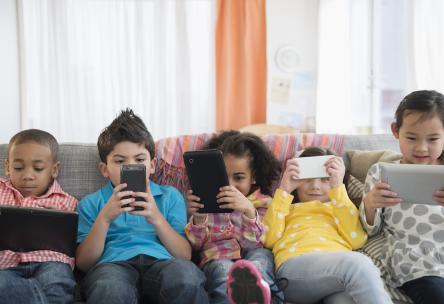Ensure your child develops a healthy relationship with smartphones and social media

At its best, social media and digital devices provide a bounty of educational and relationship-building opportunities for children. They help kids stay in touch with friends and family across the country, learn new skills (even when playing games), and stay engaged with what's happening in the world around them.
But at its worst, the connectivity of social media can sometimes come with a cost. Online profiles can be a source of bullying or peer pressure for younger teens and children, in addition to eating up time typically reserved for homework, school, or simply in-person socializing with friends and family. According to a Pew Research Center survey, 95 percent of teens reported having access to a smartphone, while 45 percent said they were online almost constantly.
And the apple doesn't fall far from the tree. A 2016 survey conducted by Common Sense Media gathered responses from nearly 1,800 parents of children ages eight to 18, and found that parents admitted to spending an average of nine hours and 22 minutes every day in front of various screens, with 82 percent of that time (seven hours and 43 minutes) for personal, not professional, activities.
The solution to too much online time? Start by setting an example.
The Importance of Monitoring Online Behavior
With parents paying so much attention to social media, it’s no wonder that it feels like, from the time they learn to talk, kids are asking for their own social media accounts. Parents may not be aware of it, but nearly all social media platforms require users to be 13 or older to access and use its services. This age limit was set by the Children’s Online Privacy Protection Act to protect children’s privacy.
But even if your child is 13 or older, they may not be quite ready to have an online profile. Parents should consider the individual personalities of their children: Can they handle the social pressures, the inevitable risks, and the big emotions that can come with social media use?
It’s sometimes hard for adults to put social media posts in perspective, and kids have an even tougher time with that. “Social media can make kids dependent on the gratification of a certain number of friends or shares or comments,” says Courtney Cruz, shift supervisor at Didi Hirsch Mental Health Services in Los Angeles. “It’s easy to compare yourself to other people, and kids don’t always realize that what people post on social media represents the good side of their lives—they’re not showing the struggles.”
Another danger is that kids will turn to social media for advice instead of turning to their parents. If parents tend to be on their phones and interacting with screens, kids learn that behavior as well. “It becomes harder for kids to talk to their parents,” says Cruz. That can mean that they will ask their questions online—crowdsourcing answers on Snapchat or Instagram, for instance—instead of at home.
And then there’s the fear that your kid will become a target for bullies. “Everyone is brave online, and that allows for bullying,” says Steve Simpson, author of “The Teenage and Young Adult Survival Handbook.” “A negative comment can get 28 likes and it can feel like the world is against you—social media amplifies hate and bullying.”
Prioritize One-on-One Time
The good news is that parents can mitigate those effects with in-person time. That means putting limits on their own social media use and modeling the idea that life doesn’t happen exclusively on a screen. Being present, making eye contact, having conversations—these things are important. Spending less time online and more time together as a family demonstrates to kids that they are valued and gives them a strong sense of their inner self.
Parental monitoring can help, too. Research shows that more than 90 percent of parents have talked to their kids about appropriate behavior online, including what to share and how to interact with others. Many parents also follow their children’s social media profiles so that they can keep an eye on what gets posted and who is connecting with their kids.
As long as kids—and their parents—aren’t letting social media rule their lives, there is room for it in a balanced lifestyle.
Don’t forget you can visit the Behavioral Health section of ibx.com 24/7 and access Magellan’s On To Better Health self-assessment tool.* This assessment offers confidential online access to self-help tools and resources proven to help emotional health and wellness. The resources include screening software and a resource library. Learn more.
*Magellan Behavioral Health, Inc., an independent company, manages mental health and substance abuse benefits for most Independence Blue Cross members